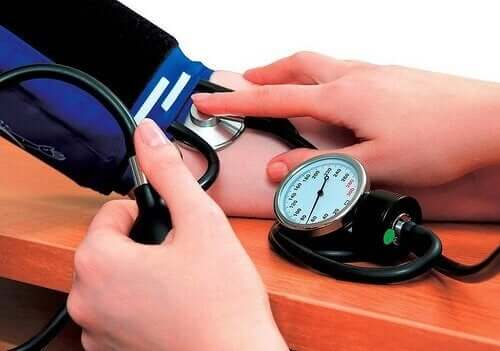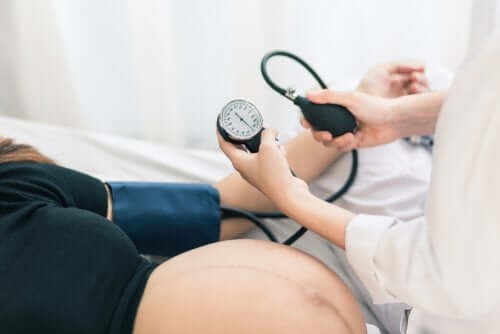High Blood Pressure During Pregnancy

Having high blood pressure during pregnancy can be a serious problem, both for mothers and their babies. That’s why it’s important that your OB/GYN evaluate your blood pressure on every visit throughout your pregnancy.
There are different types of high blood pressure that can exist in pregnant women. Altogether, these various conditions are known as hypertensive disorders of pregnancy.
What produces high blood pressure during pregnancy?
Experts are unsure of the exact causes that lead women to experience high blood pressure while pregnant. However, they believe that the condition has to do with the coming together of several reasons:
- The abnormal invasion of spiral arteries during placentation
- Poor immune tolerance of the antigens that came from the baby’s father
- Endothelial injuries.
Certain risk factors also exist when it comes to the appearance of high blood pressure during pregnancy. The following are some examples:
Risk factors regarding the baby’s parents
Experts claim that mothers that have never had children are at greater risk for high blood pressure than those who have already given birth.
Furthermore, assisted reproduction can also be a factor. That is, risk increases when the pregnancy has been the result of assisted reproduction involving gamete donation (egg or semen). The chances of high blood pressure are also greater when the father has had children with another woman who has suffered from preeclampsia.

Previous conditions in the mother
Certain preexisting conditions in women can also increase their chances of experiencing hypertensive disorders during pregnancy. Below are some of the most important characteristics and illness that can contribute to high blood pressure:
- Diabetes.
- Obesity.
- Kidney illnesses.
- An age of 35 years or older.
- A personal or family history of hypertensive disorders of pregnancy.
- Antiphospholipid syndrome.
Risk factors having to do with the pregnancy itself
If any of the following situations appear during pregnancy, then the risk of high blood pressure may increase:
- Chromosomal or congenital structural anomalies.
- Trophoblastic disease.
- Hydrops.
- Multiple births.
Is the prevention of high pressure during pregnancy possible?
To date, specialists haven’t discovered any protective interventions, except for one. The administration of small doses of acetylsalicylic acid (aspirin) in women who are at risk of developing preeclampsia can lower the risk of high blood pressure. Doctors should administer this medication starting at the 12th week of gestation and onwards.
It’s important to note that low-sodium diets are useful when hypertension exists outside of the context of pregnancy. However, they aren’t useful when it comes to hypertensive disorders of pregnancy.
What types of high pressure exist during pregnancy?
The categorization of hypertensive disorders of pregnancy depends on the moment of their appearance, the signs and symptoms, and their level of severity.
Arterial hypertension refers to numbers that are equal to or higher than 140/90 mmHg. In other words, a systolic pressure of 140 and a diastolic pressure of 90.
Chronic hypertension
Doctors apply this diagnosis to high blood pressure that appears before the 20th week of gestation. It also applies to that which remains for more than 12 weeks after the baby is born.

Gestational hypertension
Gestational hypertension refers to high blood pressure that appears after the 20th week of gestation and disappears before the 12th week of postpartum. It isn’t associated with proteinuria (the loss of proteins in the urine).
Mild Preeclampsia
This type of high blood pressure appears after the 20th week of gestation and comes hand in hand with proteinuria. In this case, the loss of proteins in the urine is greater or equal to 300mg per 24 hours of urine.
Severe preeclampsia
In order to determine if preeclampsia is severe, it must meet one or more of the following criteria:
- HTA with a systolic pressure than is greater than or equal to 160 and diastolic pressure greater than or equal to 110. In other words, 160/110 mmHg or greater.
- Protein in the urine in quantities greater than or equal to 5 grams over the course of 24 hours.
- Very high levels of serum creatinine according to blood work.
- Reduces plackets.
- Elevated liver enzymes.
- Headache, visual alterations, pain in the pit of the stomach.
- A bluish skin tone or edemas.
- A reduction in the amount of urine. Urinating less than 500 mg in 24 hours (oliguria).
Preeclampsia along with high blood pressure
This occurs when a woman loses protein in her urine, has a sudden rise in blood pressure, or displays any of the analytical alterations described previously in regards to women who suffer hypertensive disorders of pregnancy.
Eclampsia
This is the most serious hypertensive disorder of pregnancy and can lead to death. It involves convulsions that can only be attributed to preeclampsia.
The treatment of high blood pressure during pregnancy?
The only way to cure hypertensive disorders of pregnancy is to induce pregnancy. Antihypertensive drugs don’t cure this condition, but they do prevent related cardiovascular and cerebrovascular damages. It’s important that doctors administer them carefully in order not to alter the flow of blood in the uterus and placenta.

Among the tests that doctors can conduct in order to study hypertensive disorders of pregnancy we find:
- Blood tests.
- Urine tests (normal and 24 hours).
- Doppler ultrasound of the uterine arteries.
- Frequent measurement of a pregnant woman’s blood pressure.
Among the treatments that doctors can administer, we find the following:
- Antihypertensive and anticonvulsant drugs.
- Corticoids for the development of the fetus’s lungs (in case the need to induce birth arises before the 37th week of gestation).
About high blood pressure during pregnancy…
Given the seriousness of hypertensive disorders, it’s important to see your OB/GYN regularly during your pregnancy. This is especially true if you suffer from any chronic illness. At the same time, discuss any doubts you may have regarding high blood pressure with a medical specialist.
Having high blood pressure during pregnancy can be a serious problem, both for mothers and their babies. That’s why it’s important that your OB/GYN evaluate your blood pressure on every visit throughout your pregnancy.
There are different types of high blood pressure that can exist in pregnant women. Altogether, these various conditions are known as hypertensive disorders of pregnancy.
What produces high blood pressure during pregnancy?
Experts are unsure of the exact causes that lead women to experience high blood pressure while pregnant. However, they believe that the condition has to do with the coming together of several reasons:
- The abnormal invasion of spiral arteries during placentation
- Poor immune tolerance of the antigens that came from the baby’s father
- Endothelial injuries.
Certain risk factors also exist when it comes to the appearance of high blood pressure during pregnancy. The following are some examples:
Risk factors regarding the baby’s parents
Experts claim that mothers that have never had children are at greater risk for high blood pressure than those who have already given birth.
Furthermore, assisted reproduction can also be a factor. That is, risk increases when the pregnancy has been the result of assisted reproduction involving gamete donation (egg or semen). The chances of high blood pressure are also greater when the father has had children with another woman who has suffered from preeclampsia.

Previous conditions in the mother
Certain preexisting conditions in women can also increase their chances of experiencing hypertensive disorders during pregnancy. Below are some of the most important characteristics and illness that can contribute to high blood pressure:
- Diabetes.
- Obesity.
- Kidney illnesses.
- An age of 35 years or older.
- A personal or family history of hypertensive disorders of pregnancy.
- Antiphospholipid syndrome.
Risk factors having to do with the pregnancy itself
If any of the following situations appear during pregnancy, then the risk of high blood pressure may increase:
- Chromosomal or congenital structural anomalies.
- Trophoblastic disease.
- Hydrops.
- Multiple births.
Is the prevention of high pressure during pregnancy possible?
To date, specialists haven’t discovered any protective interventions, except for one. The administration of small doses of acetylsalicylic acid (aspirin) in women who are at risk of developing preeclampsia can lower the risk of high blood pressure. Doctors should administer this medication starting at the 12th week of gestation and onwards.
It’s important to note that low-sodium diets are useful when hypertension exists outside of the context of pregnancy. However, they aren’t useful when it comes to hypertensive disorders of pregnancy.
What types of high pressure exist during pregnancy?
The categorization of hypertensive disorders of pregnancy depends on the moment of their appearance, the signs and symptoms, and their level of severity.
Arterial hypertension refers to numbers that are equal to or higher than 140/90 mmHg. In other words, a systolic pressure of 140 and a diastolic pressure of 90.
Chronic hypertension
Doctors apply this diagnosis to high blood pressure that appears before the 20th week of gestation. It also applies to that which remains for more than 12 weeks after the baby is born.

Gestational hypertension
Gestational hypertension refers to high blood pressure that appears after the 20th week of gestation and disappears before the 12th week of postpartum. It isn’t associated with proteinuria (the loss of proteins in the urine).
Mild Preeclampsia
This type of high blood pressure appears after the 20th week of gestation and comes hand in hand with proteinuria. In this case, the loss of proteins in the urine is greater or equal to 300mg per 24 hours of urine.
Severe preeclampsia
In order to determine if preeclampsia is severe, it must meet one or more of the following criteria:
- HTA with a systolic pressure than is greater than or equal to 160 and diastolic pressure greater than or equal to 110. In other words, 160/110 mmHg or greater.
- Protein in the urine in quantities greater than or equal to 5 grams over the course of 24 hours.
- Very high levels of serum creatinine according to blood work.
- Reduces plackets.
- Elevated liver enzymes.
- Headache, visual alterations, pain in the pit of the stomach.
- A bluish skin tone or edemas.
- A reduction in the amount of urine. Urinating less than 500 mg in 24 hours (oliguria).
Preeclampsia along with high blood pressure
This occurs when a woman loses protein in her urine, has a sudden rise in blood pressure, or displays any of the analytical alterations described previously in regards to women who suffer hypertensive disorders of pregnancy.
Eclampsia
This is the most serious hypertensive disorder of pregnancy and can lead to death. It involves convulsions that can only be attributed to preeclampsia.
The treatment of high blood pressure during pregnancy?
The only way to cure hypertensive disorders of pregnancy is to induce pregnancy. Antihypertensive drugs don’t cure this condition, but they do prevent related cardiovascular and cerebrovascular damages. It’s important that doctors administer them carefully in order not to alter the flow of blood in the uterus and placenta.

Among the tests that doctors can conduct in order to study hypertensive disorders of pregnancy we find:
- Blood tests.
- Urine tests (normal and 24 hours).
- Doppler ultrasound of the uterine arteries.
- Frequent measurement of a pregnant woman’s blood pressure.
Among the treatments that doctors can administer, we find the following:
- Antihypertensive and anticonvulsant drugs.
- Corticoids for the development of the fetus’s lungs (in case the need to induce birth arises before the 37th week of gestation).
About high blood pressure during pregnancy…
Given the seriousness of hypertensive disorders, it’s important to see your OB/GYN regularly during your pregnancy. This is especially true if you suffer from any chronic illness. At the same time, discuss any doubts you may have regarding high blood pressure with a medical specialist.
All cited sources were thoroughly reviewed by our team to ensure their quality, reliability, currency, and validity. The bibliography of this article was considered reliable and of academic or scientific accuracy.
- Vásquez Valerio, L. (2017). Estados hipertensivos del embarazo. Revista Medica Sinergia, 2(3), 12-15. Recuperado a partir de http://revistamedicasinergia.com/index.php/rms/article/view/68
- Espinilla Sanz, B., Tomé Blanco, E., Sadornil Vicario, M., Albillos Alonso, L. (2016). Manual de obstetricia para matronas. 2nd ed. Valladolid: DIFÁCIL.
This text is provided for informational purposes only and does not replace consultation with a professional. If in doubt, consult your specialist.








